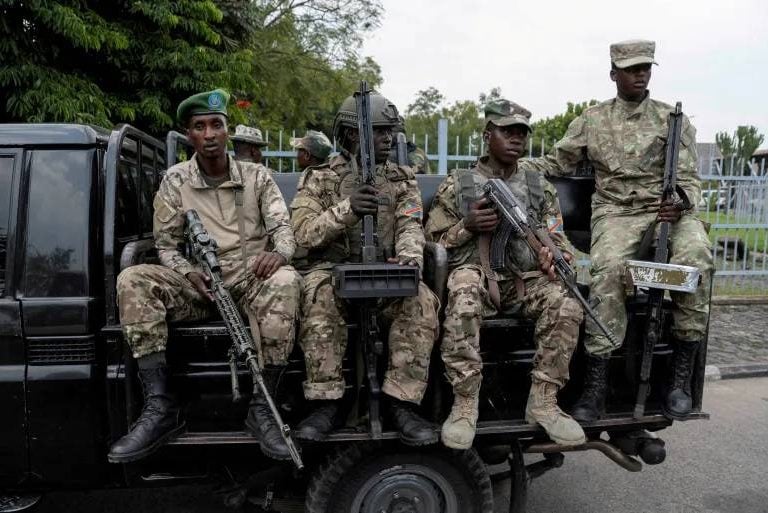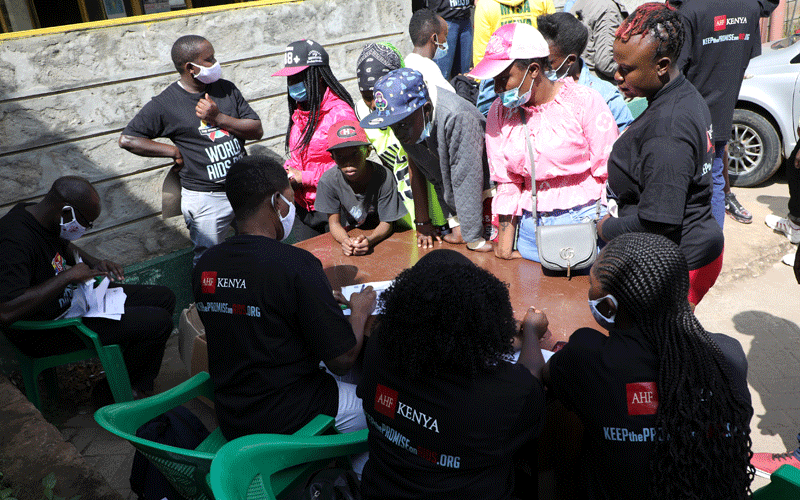Organisations take war against scourge to Nairobi slums
By George Kebaso, December 10, 2020George Kebaso @Morarak
A youth group has started a campaign to educate people on the dangers as HIV/Aids, as the world’s attention turns to fighting Covid-19.
U Tena, an acronym of Ungana Tena Youth organisation operating in Viwandani Ward in Industrial Area is responding to fears there could be a surge in HIV/Aids infections due to the spike in teenage pregnancies in adjacent slums.
Mary Wanjiru Mutua says data collected by Judy Kamene and Beatrice Muthoni shows that five out of some 40 Form Three girls, have dropped out of school due to pregnancies this year.
Back burner
“This is a conservative number. There are many more who are not coming out to speak up,” Wanjiru told People Daily at MYSA Grounds on Kangundo Road where Africa Healthcare Foundation (AHF) hosted the World AIDS Day celebrations last week themed: The Other Pandemic.
Under the U_Tena Youth organisation, there are several youth groups involved in awareness and peer education in 14 villages in Viwandani ward.
Kamene pointed out that peer pressure and poor parenting have pushed most of the young people in Viwandani, which includes Mukuru slums to involvement in drugs, alcohol and unprotected sex.
“The bottom line is that there is a lot of focus on Covid-19 while HIV has been pushed to the back burner,” Kamene said.
Another contributing factor according to Wanjiru is the revision of curfew hours that extended nighttime, allowing the young people to stay out longer.
Officials of AHF and other AIDS-free society warned that new HIV infections that are yet to be captured by the government and partners could have spiraled out of control.
Mary Nyaguthii, AHF Prevention Manager cautioned that while Covid-19 remains the world’s main focus, it’s important to remember that the fight against HIV is not yet over.
“From initial findings – that are largely informal – there is an indication of rise in teenage pregnancies across all the 47 counties.
This means that there is a lot of unprotected sex happening, or coerced sexual incidents.
And with the disruptions in the supply and uptake of reproductive health commodities such as condoms due to Covid-19, the problem could worsen,” she said.
She said that it should not be forgotten that millions of Kenyans are still in need of the life-saving ARVs whose supply has also been erratic due to the Coronavirus pandemic in the world.
“While Covid-19 has devastated communities worldwide and remained in the spotlight since last year, the world must keep fighting to protect gains made against HIV/Aids—a pandemic that has been raging for over 30 years and remains a global public health crisis,” she added.
Sustain fight
AHF Country Programme Director, Dr. Samuel Kinyanjui, said the focus on HIV needs to be sustained even at a time when the country and world is faced by The COVID-19 pandemic.
“We need to sustain the funding, sustain the prevention efforts and treatment for us to get to the global targets of AIDS free generation,” he said, calling on the government to push up domestic funding to more than 50 percent.
According to the most recent UNAIDS statistics, 38 million people are living with HIV/Aids around the world, and in 2019 alone, 1.7 million people became newly infected with HIV and 690,000 died from AIDS-related illnesses.
More Articles

